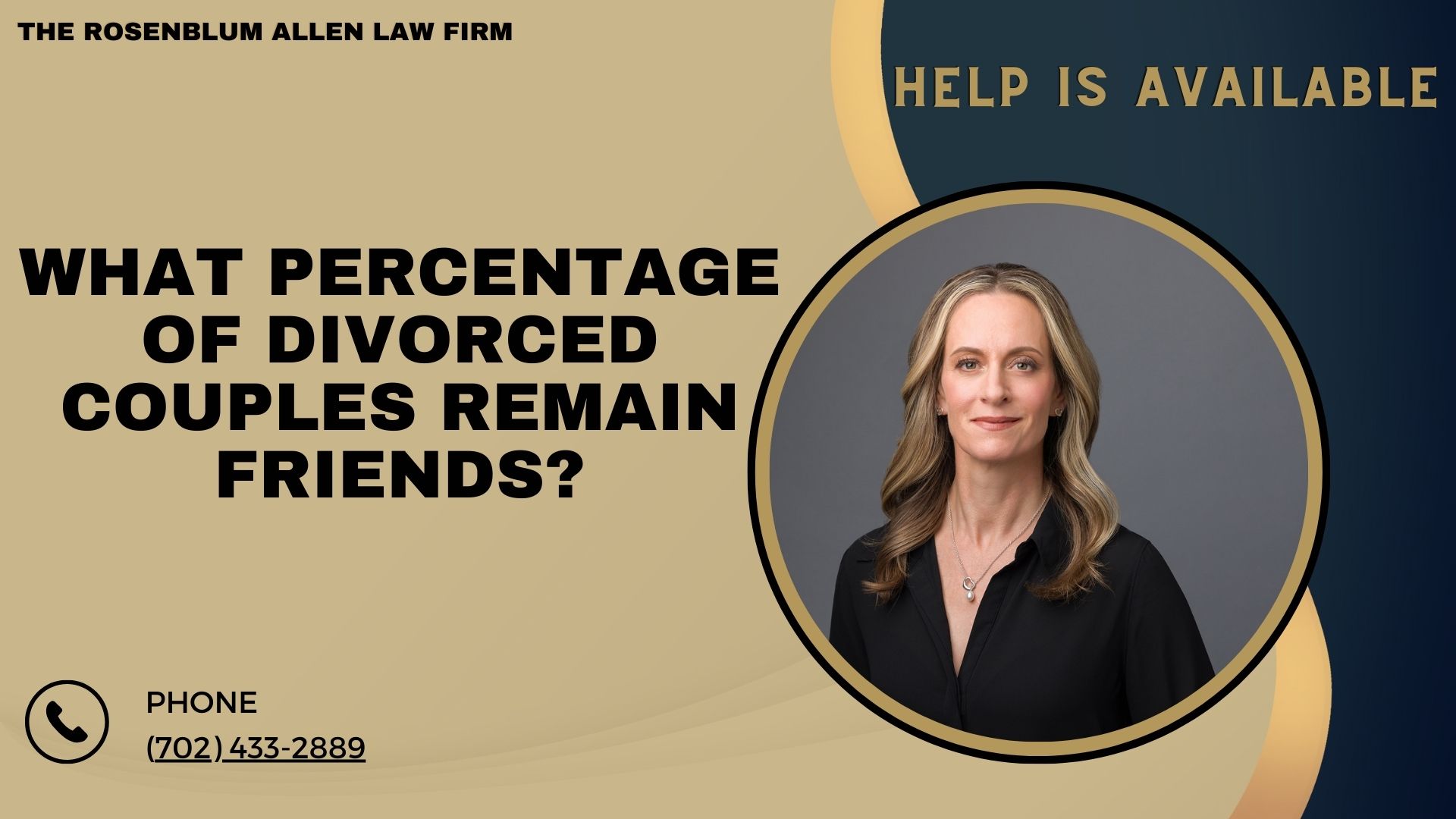Divorce isn’t just about signing papers and parting ways. It’s an emotional rollercoaster. But amidst the turmoil, some couples manage to remain friends. Why? Let’s dive into the fascinating world of post-divorce friendships.
 The Concept of Friendship After Divorce
The Concept of Friendship After Divorce
Friendship after divorce sounds like a plot from a modern romance novel. But, it’s more common than you think. Here’s what it looks like:
Emotional Support: Sharing a unique bond that’s transformed but not broken.
Co-parenting Dynamics: Teamwork in raising children, proving that family remains the priority.
Social Interactions: Continuing to share a social circle gracefully.
Why Some Couples Stay Friends:
The Breakup’s Nature: Amicable separations lead to stronger post-divorce bonds.
Mutual Respect: Key to transitioning from spouses to friends.
Time Heals: As wounds heal, friendship becomes a possibility.

Statistics on Divorced Couples Remaining Friends
Surprisingly, the numbers are more optimistic than you might expect:
General Findings: A significant percentage maintain some form of friendship.
Age and Children: Younger couples and those with children tend to stay connected.
Geographic Differences: Location influences post-divorce relationships.
Benefits of Remaining Friends After Divorce
Why bother? Here are a few good reasons:
For the Adults: Emotional support and sharing responsibilities make life easier.
For the Kids: Children benefit from seeing their parents cooperate and respect each other.
Practical Perks: From sharing expenses to helping each other move on, the benefits are real.

Challenges in Maintaining Friendship After Divorce
It could be smoother sailing. Here’s what can rock the boat:
Jealousy and New Partners: Introducing new significant others can test the friendship.
Unresolved Issues: Old arguments can resurface.
Boundaries: Finding the right balance between closeness and independence.
How to Foster a Friendship After Divorce
Want to give it a try? Follow these steps:
Communicate: Talk openly about your feelings and expectations.
Seek Therapy: Professional help can guide you through the transition.
New Boundaries: Redefine your relationship in a way that works for both of you.
Real-life Examples and Case Studies
Real stories of couples who turned their failed romance into a thriving friendship. Each story highlights different paths taken and obstacles overcome.

Breaking It All Down
Friendship after divorce is possible and can be rewarding. It takes work, patience, and a willingness to overcome old grievances. The rewards can be big for those willing to try. They include shared joy in your children’s milestones. And having someone who truly understands your journey.

Frequently Asked Questions
Can divorced couples become friends immediately after their divorce?
Becoming friends right after a divorce might be hard. This is because of the emotional turmoil involved. Typically, it takes time to adjust and heal. Then, friendship becomes possible.
Does staying friends with an ex affect new relationships?
Yes, maintaining a friendship with an ex can impact new relationships. It’s important to talk openly with new partners about this dynamic. You should set healthy boundaries that respect everyone.
Are there any legal implications for remaining friends after divorce?
Friendship doesn’t have direct legal effects. But, it can lead to friendlier negotiations. These are about custody, alimony, and other divorce deals. Always consult with a legal professional about your specific situation.
How do children benefit from their divorced parents remaining friends?
Children can greatly enjoy their parents’ continued friendship. They see their parents collaborate and support each other after the divorce. This gives them a sense of stability and security.
Is it common for friendships between divorced couples to fluctuate?
Yes, it’s normal for these friendships to have ups and downs. This is especially true as each person heals and enters new relationships.
How can divorced couples navigate the transition from being married to being friends?
A key strategy is setting new boundaries that redefine the relationship. Focusing on mutual respect is key. This means finding common ground, like shared interests or co-parenting goals. It is also helpful.
What should I do if my attempt to remain friends with my ex is not working?
If friendship isn’t possible, you may need a more distant, co-parenting-only relationship. Or, you may need external support, such as counseling. This will help you navigate the emotions and logistics involved.
How do societal and cultural perceptions affect post-divorce friendships?
Societal and cultural norms can influence how divorced couples view their friendships. In some cultures, they encourage maintaining a friendly relationship after divorce. In others, it may be less common or accepted.
Can therapy help divorced couples become friends?
Yes, therapy can be an excellent resource for transitioning from spouses to friends. It provides a neutral space to address issues. It helps learn healthy communication.
What steps can I take if my family or friends disapprove of my friendship with my ex?
Open communication about your reasons for maintaining the friendship can help. It’s also important to set boundaries with family and friends. You should affirm your decision while respecting their concerns.
How can divorced couples maintain their friendship when one or both start dating again?
Honesty and clear communication about new relationships are crucial. Discuss how to handle introductions. Also, talk about social gatherings and other overlaps. This can help manage this transition well.
What signs a friendship with an ex might not be healthy?
It may be unhealthy if the friendship causes much distress or jealousy. It may also be bad if it interferes with moving forward. It’s essential to be honest and consider professional advice if needed.

Additional Resources for You
As you navigate the complexities of your personal legal journey, it’s important to have reliable resources at your disposal. Our lead attorney, Molly Rosenblum Allen, Esq., has diligently curated a suite of helpful materials to assist you during this time. Below is a list of resources created with your needs in mind:
Las Vegas Family Law Attorneys: Explore comprehensive legal support for family law matters in Las Vegas. Learn more.
Family Court Las Vegas: Get insight into navigating the family court system in Las Vegas effectively. Discover how.
Common Law Marriage in Nevada: Understand the legal standing of common law marriage in Nevada and what it means for you. Find out more.
Name Change Las Vegas: Considering a name change in Las Vegas? Here’s what you need to know. Read further.
Nevada Power of Attorney: Learn about the nuances of establishing a power of attorney in Nevada. Dive deeper.
How to File a Motion in Family Court: A guide to filing motions in family court, simplifying the process. See the guide.
Family Court Mediation: Discover the benefits of mediation in family court and how it can aid in your situation. Explore the benefits.
Unbundled Attorney: Understand the concept of unbundled legal services and how they can be cost-effective for your case. Learn about the option.
Nevada Adoption: Thinking of adoption in Nevada? Here’s everything you need to know to start your journey. Get started.
These resources have been created to provide you with valuable insights and guidance. Molly Rosenblum Allen, Esq., and The Rosenblum Allen Law Firm are committed to offering support and expertise to those navigating the legal landscape in Las Vegas, especially during challenging times.

Outside Resources for You
American Psychological Association (APA): Offers insights into the psychological aspects of divorce and maintaining healthy relationships post-divorce. Visit APA.
National Association of Divorce Professionals (NADP): A network of professionals from various fields who specialize in divorce-related services. Explore NADP.
American Association for Marriage and Family Therapy (AAMFT): Provides resources for couples and families dealing with divorce and its aftermath. Discover AAMFT.
Kids’ Health from Nemours: Offers advice on helping children cope with divorce, fostering a supportive environment. Visit Kids’ Health.
Mediate.com: A comprehensive resource for finding mediators, especially for divorce and family disputes. Explore Mediate.
American Bar Association (ABA) – Family Law Section: Provides legal resources and information pertaining to family law and divorce. Visit ABA Family Law.
Child Welfare Information Gateway: Contains information and resources on child welfare, including co-parenting tips for divorced parents. Discover Child Welfare Information Gateway.

A Special Message from Our Lead Attorney, Molly Rosenblum Allen, Esq

Dear Reader,
Thank you sincerely for taking the time to engage with our resources. I hope you found the information valuable. It offered clarity and support as you navigate.
We understand family law’s complexities. It is full of emotional challenges. You might be getting divorced. You might be thinking about adoption. Or, you might face another family law issue. Know that you don’t have to do it alone. My team and I are here to provide you with the legal expertise and compassionate support you need.
If you feel ready to take the next step or have questions about your situation, please call us at (702) 433-2889. Let’s discuss how we can assist you in moving forward. We do not offer a free consultation. But, we are committed to providing thorough and kind guidance. It will be tailored to your unique situation.
Looking forward to the opportunity to help,
Molly Rosenblum Allen, Esq.
The Rosenblum Allen Law Firm




